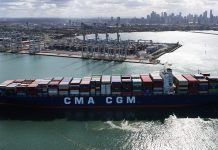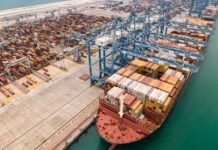
Several rapidly growing value retailers in the United Kingdom have teamed up with Peel Ports Group, a major UK port operator, to advocate for a fresh approach to the country’s port entry strategy. They aim to streamline lead times, cut costs, and reduce carbon emissions.
Major discount brands, including TJ Morris, the parent company of Home Bargains, are pushing for shipping lines to adopt a new North/South, two-port strategy in the UK. This strategy would involve utilizing both northern and southern ports for handling deep-sea containerized cargo.
Traditionally, 90% of deep-sea containerized cargo arrives in the UK via southern ports, despite 60% of these goods being ultimately destined for the north. This situation presents numerous challenges, such as limited rail and HGV driver capacity, congested roads, cargo delays, inefficient landside logistics, and increased pollution due to unnecessarily long road journeys.
This proposed shift in approach was discussed during a webinar hosted jointly by Peel Ports Group and the British Retail Consortium. Retail leaders argue that updating the current outdated model would significantly improve the efficiency of the country’s retail supply chain.
During the webinar titled “The 60/90 Dilemma: why sluggish UK retail supply chains are overdue a rethink,” the panel, featuring TJ Morris Freight manager John Cavanagh and Trinity Logistics managing director Amanda Unsworth, discussed the benefits of bringing the import of goods closer to their final destinations. They emphasized that this approach would lead to a more efficient, resilient, and sustainable retail supply chain.
The panel highlighted how implementing a two-port strategy would enhance operational efficiency for retailers, enabling them to better respond to customer demands and capitalize on market trends. They argued that a North/South strategy would mitigate delays caused by factors like adverse weather conditions or unforeseen incidents on road and rail.
Furthermore, the panel urged collaboration among shipping lines, the government, and port operators to materialize the implementation of a two-part strategy.
“A North-South, two-port UK strategy could address many of the country’s logistics challenges, transforming and modernising supply chains for retailers and other cargo owners. There’s a high level of support from the retail sector, driven by a need to better optimise the flow of seaborne cargo to enable much greater landside efficiencies. If we’re to see a supply chain which works with retailers, not against them, then it makes little sense to rely on the current status quo – we need to utilise the ports of entry in the north and across the whole country,” stated Stephen Carr, group commercial director at Peel Ports Group.
Also, in a recent survey conducted by Peel Ports, the UK’s second-largest port operator, hundreds of UK retail leaders and cargo owners were polled. The survey results showed that 76% of respondents expressed a desire to have goods imported closer to their final destinations. Additionally, the research highlighted that enhancing sustainability is a significant goal for retailers.
According to the survey findings, 77% of participants stated that reducing carbon emissions ranks among their top strategic priorities, while 79% emphasized the necessity for more efficient transportation of goods to decrease greenhouse gas emissions.





